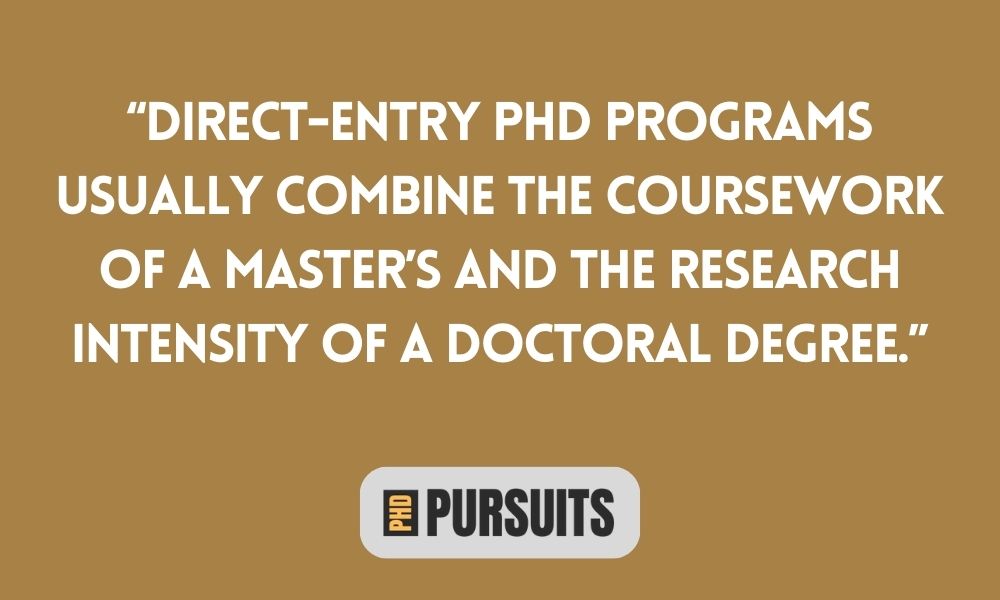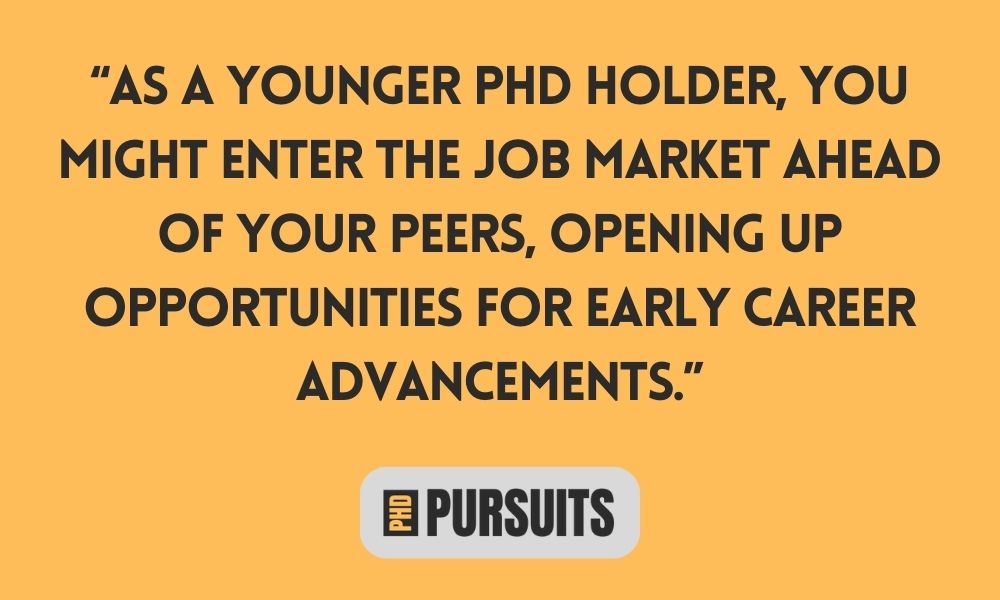If you decide to earn a PhD, it means you’ll delve into the depths of specialized knowledge, aiming for the pinnacle of academic achievement.
A common question among aspiring doctoral candidates is whether a master’s degree is a prerequisite. Do you need a masters to get a PhD?
it’s possible to go straight to a PhD in some fields. This route is often termed as integrated PhD programs, or direct-entry PhDs. There are many upsides, as well as downsides to go straight to PhD without masters however.
In this post, we explore if you can get a PhD straight without a masters degree. Aside from that, we also explore if this is a good idea, and tips when applying for one.
Do You Need A Masters To Get A PhD?
If you are holding a bachelor’s degree, it’s possible to go straight to a PhD in some fields. This route is often termed as ‘integrated PhD programs’ or ‘direct-entry PhDs.’
These programs combine the coursework of a master’s and the research intensity of a doctoral degree, enabling students to undertake a PhD without first completing a master’s degree.

This pathway is particularly appealing for those ready to commit to the long haul of doctoral research straight after their undergraduate studies.
PhD programs that offer this option are usually structured to include an initial phase where students complete graduate-level coursework before fully diving into their doctoral research.
This setup ensures candidates acquire the necessary foundational knowledge and research skills. Many universities offer such programs, such as McGill.
In some cases, students might be ‘upgraded’ to a PhD candidate status after successfully passing certain assessments or completing initial research projects, bypassing the need for a separate master’s degree.
For those pondering whether to apply for a PhD without a master’s, it’s crucial to consider your readiness for such an intense academic commitment.
Some students find that completing a master’s first provides valuable research experience and a clearer understanding of their academic interests.
Yet, for those with a clear research vision and a strong undergraduate record, diving directly into a PhD program can be a direct and efficient path to achieving their academic and professional goals.
Advantages In Doing A PhD Without A Masters Degree
Embarking on a PhD journey without a master’s degree might seem like skipping a step, but for many, it’s a strategic leap forward. Here are several compelling advantages of diving directly into a doctoral program:
Time Efficiency
You save significant time by going straight from a bachelor’s to a PhD program. Traditional routes often see students spending 1-2 years on a master’s before even starting their doctoral research.
By eliminating this step, you can focus on your PhD research earlier, potentially reducing the overall time spent in academia.
Cost Savings
The financial aspect cannot be overlooked. Skipping a master’s degree means you avoid the tuition fees associated with these programs. Given the substantial costs of higher education, this can lead to significant savings.
Plus, many PhD programs offer stipends to their students, turning your educational pursuit from a financial burden into a funded opportunity.
Early Career Launch
Starting your doctoral research without delay can give you a head start in your academic or research career.
As a younger PhD holder, you might enter the job market ahead of your peers, opening up opportunities for early career advancements and potentially impacting your lifetime earnings positively.

Direct Access to Research Opportunities
In a PhD program, you immerse yourself in research from the outset. This immediate focus allows you to develop a deeper understanding of your field earlier in your academic journey.
You engage with cutting-edge research, contribute to your discipline, and build a network of professional contacts—all of which can enhance your career prospects.
Maturity and Focus
For those who are clear about their research interests, bypassing a master’s program can demonstrate a high level of commitment and maturity. It shows you’re ready to tackle complex problems and undertake significant research projects.
This level of focus can be appealing to potential supervisors and can enrich your PhD application, making you a strong candidate for competitive programs.
Disadvantages In Doing A PhD Without A Masters Degree
Opting for a PhD without completing a master’s degree first might seem like a fast track to academic success, but it’s not without its challenges. Here are five potential disadvantages to consider:
Skill Gaps
A master’s program is designed to bridge the gap between undergraduate studies and doctoral research, honing:
- critical thinking,
- research methodologies, and
- academic writing skills.
Skipping this step could leave you playing catch-up, especially in fields where advanced technical skills or specialized knowledge from a master’s curriculum are assumed knowledge in PhD programs.
Research Depth
Master’s students often undertake a substantial research project or thesis, which can be a valuable precursor to the more demanding PhD dissertation.
Without this experience, you might find yourself less prepared for the complexities of doctoral-level research, including:
- designing studies,
- analyzing data, and
- interpreting results.
Network Building
Master’s programs offer opportunities to build a professional network, including peers, faculty, and industry contacts. These connections can be crucial for:
- collaborative research,
- future employment, and
- postdoctoral opportunities.
Entering a PhD program directly might limit your early networking opportunities, potentially impacting your career development.
Funding Challenges
Some funding bodies and scholarships are tailored specifically for students who have completed a master’s degree, recognizing the additional qualifications and experience they bring to doctoral research.
Without a master’s degree, you might find your options for financial support more limited, which could affect your ability to secure funding for your research.

Academic Pressure
The transition from an undergraduate degree to a PhD program can be steep, with increased expectations and pressure to perform.
Without the gradual buildup of responsibility and complexity that a master’s degree provides, the sudden jump to doctoral-level studies can be overwhelming, leading to higher stress levels and potentially impacting your mental health and well-being.
In some situation, it may make sense to jump from a bachelor’s degree, to a non-dissertation doctorate degree.
How Long Does It Take To Get A PhD Without A Masters Degree?
Venturing into a PhD program without a master’s degree can reshape the academic journey in significant ways. This includes includes how long it takes to reach the pinnacle of your doctoral studies.
Typically, a PhD without masters degree can span anywhere from four to six years, depending on various factors like:
- the field of study,
- the structure of the program, and
- your pace of research.
For those diving straight from a bachelor’s to a PhD, programs often integrate initial coursework. This ensures you’re well-prepared for the rigorous research ahead.
This means you might spend the first year or two focusing on advanced courses before transitioning to full-time research.
While this integrated approach aims to equip you with the necessary skills and knowledge, it also means your total time commitment mirrors that of students who first complete a master’s degree.
In fields like engineering or natural sciences, a direct-to-PhD path can be relatively common and structured to be completed within four to five years.
Here, the emphasis on lab work and experimental research often allows for a seamless transition from coursework to dissertation.
In contrast, disciplines within humanities and social sciences may see a wider range in duration due to the nature of the research, which can be more self-directed and less predictable.
Moreover, the dynamics of your research project, the guidance of your PhD supervisor, and the requirements set by the doctoral program all play pivotal roles in determining the length of your PhD journey.
Some students manage to expedite their research, wrapping up in just under four years, while others might need more time to navigate the complexities of their dissertations.
Ultimately, the goal is not just to complete the PhD but to do so with a body of work that contributes meaningfully to your field.
While the prospect of earning a PhD without first obtaining a master’s degree offers a streamlined educational path, it’s the quality and impact of your research that define the success of your doctoral journey.
Tips When Applying To A Doctorate Program Without Masters
Applying to a PhD program without a master’s degree can feel like charting unfamiliar territory. Here are five tips to navigate this process successfully:
Highlight Your Undergraduate Research
Emphasize any research projects, thesis work, or relevant academic pursuits from your bachelor’s degree. This demonstrates your capability to undertake significant research, a key component of doctoral studies.
If you’ve published papers or presented at conferences, make sure these achievements stand out in your application.
Seek Strong Recommendations
Letters from professors who can attest to your research potential and academic prowess are invaluable. Choose mentors who are familiar with your:
- work ethic,
- intellectual curiosity, and
- contributions to your field.
Their endorsement can compensate for the lack of a master’s degree by affirming your readiness for doctoral-level research.
Craft a Compelling Research Proposal
Your research proposal is a critical piece of your application. It should not only reflect a deep understanding of your chosen field but also convey originality and the potential to contribute new knowledge.
Be clear about how your research interests align with the expertise available in the PhD program you’re applying to.
Demonstrate Your Commitment
Use your personal statement to articulate why you’re choosing to go straight to a PhD and how this path aligns with your career and research goals.
Showing a clear vision and dedication can reassure admissions committees of your seriousness and preparedness for the challenges ahead.

Prepare for Interviews
If you’re invited for an interview, it’s your chance to make a personal impression. Be ready to discuss your research interests, previous projects, and how you’ll manage the transition directly into a PhD program.
Showing enthusiasm, confidence, and a readiness to engage in advanced research can significantly bolster your application.
Navigating to a PhD without a master’s degree requires a strong application that showcases your:
- research capabilities,
- academic achievements, and
- determination.
With careful preparation and a focus on your strengths, you can present a compelling case for why you’re ready to take on the challenges of a doctoral program.
Ready To Go Straight To PhD Program Without A Masters?
While a master’s degree can be a valuable, it’s not always a prerequisite for pursuing a PhD. Many programs offer pathways that allow students to embark directly on their doctoral studies, bypassing the master’s degree.
Each path has its merits and challenges. The best choice depends on your individual academic background, research interests, and career goals.
Ultimately, a clear vision and dedication are key to success in any PhD program.

Dr. JW Ong holds academic degrees, including a Ph.D. in Applied Linguistics from universities in New Zealand, Malaysia, and the UK. He started PhDPursuits.com as a way to share the experience he wish he would have had known before embarking on his PhD.

